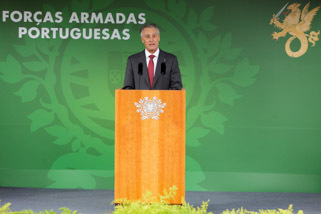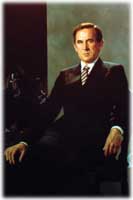
 António dos Santos Ramalho Eanes
António dos Santos Ramalho Eanes
Born in Alcains on 25 January 1935.
Father: Manuel dos Santos Eanes (builder and landowner); mother: Maria do Rosário Ramalho.
Married to Maria Manuela Duarte Neto de Portugal Eanes.
Education and training: Liceu de Castelo Branco (1942-1952); Army School (1952-1956); CIOE training (Special Operations Instruction Course) (1962); Training period as Psychological Action Instructor at Instituto de Altos Estudos Militares (1969); Lisbon Law Faculty (Political Sciences and Constitutional Law); Higher Institute of Applied Psychology (3 years).
CAREER
Profession: Infantry officer – second-lieutenant (1957); lieutenant (1959); captain (1961); commissioned to major (1970); major (1973); lieutenant- colonel (1974); colonel (1976); commissioned to general (1975) and general (1976).
Duties: Tours of duty: India (1958-1960); Macao (1962); Mozambique (1964, 1966-1968); Guinea (1969-1971); Angola (1971-Abril de 1974); Ad-hoc commission for the Media (30.4.1974); Chairman of the Board of RTP (Portuguese television) (October 1974 to 11 March1975); Army Chief of Staff (6 December1975 to February 1976); Armed Forces Chief of Staff (July 1976 – January 1981); President of PRD (Partido Renovador Democrático Democratic Renewal Party) (19.8.1986 to 5.8.1987); elected Member of Parliament (19.07.1987); member of the Council of State (since 18.3.1986).
ELECTION AND PRESIDENTIAL PERIOD
Elected in the first round on 27.6.1976 (61,59% - 2 967 137 votes). The defeated candidates were: Otelo Saraiva de Carvalho (16,46% - 792 760 votes), Pinheiro de Azevedo (14,37% - 692 147 votes) and Octávio Pato (7,59% - 365 586 votes). Re-elected in the first round on 7.12.1980 (56,44% - 3 262 520 votes). The defeated candidates were: Soares Carneiro (40,23% - 2 325 481 votes); Otelo Saraiva de Carvalho (1,49% - 85 896 votes); Galvão de Melo (0,84% - 48 468 votes), Pires Veloso (0,78% - 451.32 votes) and Aires Rodrigues (0,22% - 12 745 votes).
President from 14.7.1976 to 9.3.1986.
Of modest yet relatively comfortable origins, he was nevertheless forced to join the army instead of following his choice, medicine, which was considerably more expensive. He was of that generation of officers who began their career in the late 50s and served throughout the colonial war. In 1974, they were already in intermediate positions – majors, lieutenant-colonels, etc, and led the movement contesting the alterations to the military career made by Marcelo Caetano and to the Congresso dos Combatentes (1973) and also headed the Armed Forced Movement which came about following the radicalization and politicization of the initial objectives. On 25.4.1974 he was in Angola and did not take part in the military operations that overthrew the New State, but was immediately recalled to Lisbon.
During his tour of duty in Guinea he became close to two key men in the new power structure: Spínola and Otelo – his room-mate. Under the former’s orders and in the latter’s company he served as information officer charged with setting up the Radio-broadcasting and Press Service. He then ended up by becoming chairman of RTP, the most powerful public opinion maker. His impartiality during this time did not spare him from pressures and accusations and culminated in his alleged implication in the movement of 11 March 1975. He resigned immediately and demanded an inquiry into his actions. Having been totally exonerated he was placed at the Armed Forces Staff Headquarters. He was linked to the moderate military known as the “Group of Nine”, who charged him with preparing the operational plans to repress any coup attempt by the more radical faction of the Armed Forces. This was successfully applied on 25 November 1975. Immediately afterwards he occupied the post of Chief of Army Staff.
Following the agreement of the second MFA/Parties pact (13.1.1976) for direct elections to the Presidency of the Republic he became, for reasons that in other circumstances would have been obstacles (such as being a soldier and independent, or his political inexperience) the strongest presidential candidate (date when candidacy announced: 14.5.1976) with the support of the moderate military and the main parties - PS, PSD and CDS. His victory in the 1976 presidential elections, when Otelo Saraiva de Carvalho and his revolutionary project were clearly defeated (16,5%), legitimated the end of the revolutionary process (known as PREC), which months earlier had already been militarily defeated. He became the first President of the Republic elected under the terms of the current Constitution.
In an attempt to tone down the radical divisions – which had led to shootings and one death when he campaigned in Évora (18.6.1976) – he said he wanted to be the “President of all the Portuguese”, a slogan that has been adopted by his successors.
His first term in office was marked by the issue of the military issue and, like Costa Gomes, as President of the Republic he combined the powers of Commander in Chief of the Armed Forces with those of Chief of Defence Staff, whilst also presiding at the Council of the Revolution, as President of the Republic. He always stressed that the mission of the Armed Forces was merely to guarantee that the legitimate choices made in free elections should be respected (e.g. see his speech of 25.11.1979). He worked to re-establish the hierarchy and discipline and impose soldiers’ return to their barracks. As regards this essential aspect of a return to normal, his success was total and decisive.
One of the fundamental components of his foreign initiatives was Portugal’s relation with the NATO countries which had shown their support for President Eanes’s initiatives described above - e.g. Honorary President of the North Atlantic Council (London, May 1977). In this context relations with the USA were essential - Carter visited Portugal (June 1980) and Eanes visited the United States (July 1978). He did not ignore his European allies and paid visits to England (1978), Germany (1977), France (1979) and Italy (1980). In a national ideological context that was still very left-wing, even among the moderates, he also paid attention to relations with the non-aligned countries (such as Yugoslavia under Tito, with whom he appears to have established empathy) (1977 and 1979). He also revealed empathy with the rulers of the former colonies where he made it a priority to re-establish normal relations: visits to Guinea (1978, 1979 and 1982), Cape Verde (1978 and 1980), São Tomé (1979) and Mozambique (1980). Angola was the exception (he only went in 1982) due to existing problems (civil war, the coup by Nito Alves). He resorted to intermediation by Luís Cabral at the Bissau Summit (June 1978). He also concentrated on relations with the new Spain under King Juan Carlos I (visits in 1977 and 1978), not forgetting the Vatican on a visit that given the electoral dividends it could bring was criticized by Prime Minister Sá Carneiro (May 1980).
In terms of domestic policy his performance was more difficult and controversial. His idea of the Presidency as a power of arbitration that could and should publicly criticise the government and the political parties, thus hoping to correct their actions, was seen by parliamentary leaders as a challenge to their authority, a Gaullist strategy. In 1976, a significant group of dissidents from various parties tried to convince President Eanes to take that strategy to what they considered to be its last and logical consequence: the formation of a presidential party. He refused. Having failed in their attempts to obtain his support, one by one the main parliamentary leaders designated him as their favourite target. This led to the discontent in the I Constitutional Government concerning a critical speech made by President Eanes (25.4.1977), the formation of the II Constitutional Government which Eanes dismissed (27.7.1978) when it was in an obvious crisis; then the formation of three Presidential governments, the first two which did not pass in Parliament and the III Constitutional Government, led by Maria de Lurdes Pintassilgo, only managed it because the President undertook that it would be no more than a transition government with early elections set (for 13.7.1978). The Democratic Alliance or AD won these elections (2.12.1979) and reinforced their position in further elections (5.8.1980), already in open confrontation with Eanes. This fact, coupled with the prestige he maintained because of many people’s empathy with an austere man who stood aloof from the parties, led to the decisive support of the Socialist Party or PS (with conditions that were fixed in the November 1980 agreement) leading to his victory. This victory took place in the first round, and was also made easier by the electoral inexperience of the AD candidate, General Soares Carneiro. There were costs attached to this conflictuality, however, and the first revision of the Constitution (12.8.1982) reduced his powers in two essential areas – foreign policy and defence – which had already been substantially reduced by force of circumstances: the success of demilitarization, the return to normal in foreign relations and his electoral agreement with the PS.
On 4 February 1983, President Eanes called early elections. After the resignation of Prime Minister Pinto Balsemão who (on 5.1.1981) had replaced Sá Carneiro after his death (4.12.1980), he refused to designate Prime Minister Vítor Crespo, appointed by the PSD and approved by the Council of State by a narrow margin (8 votes against 7). He maintained relatively peaceful relations with the “central bloc" government (PS/PSD) formed following the elections of 25.4.1983. At the end of his term of office, and without powers, he no longer resisted the call to form a party in his image. In July 1984 he announced that after leaving the Presidency he would continue his political activity in a party and whilst still President a new party emerged: the Democratic Renewal Party or PRD (24.2.1985), with great electoral (legislative elections on 6.10.1985 and 17,9% of the votes) and political (new party in Parliament) weight. However, with the defeat of Salgado Zenha, the candidate he had supported to be his successor (on 16.11.1985), one day after announcing his candidacy, Eanes handed over the Presidency to his great adversary Mário Soares. His duration as party leader was short and ended when he took responsibility for the poor elections results of the PRD in 1987, having resigned from the party leadership. He was mentioned as a possible candidate to the 1996 presidential elections, which he denied.
Retired from active politics, Ramalho Eanes continues, as a member of the civil society, intervening in matters he considers relevant, especially civic and cultural, through taking part in congresses and conferences on the most diverse terms (cultural, political, social and sociological, geopolitical and geostrategic), in specialized forums, local authorities and universities, both in Portugal and abroad.
In 2000, he rejects his promotion to Marshal.
In 2006 he obtains a Doctorate in Political Philosophy, with unanimous approval, eulogy and distinction, from the University of Navarre, with the presentation of a thesis with the title Civil Society and Political Power in Portugal, which he dedicates to the Portuguese and to Portugal, to whom he wishes “a future of happy and responsible freedom, and a citizenry of achievement” and which he ends appealing to civic participation, above all from the younger generations, “who have already been born in the midst of democracy, and that thus should guarantee its preservation, through a clear and driven growth”.
Currently (like all presidents who have already completed their term of office and been elected under the current Constitution) he is a lifelong member of the Council of State.
© 2006-2016 Presidency of the Portuguese Republic
You have gained access to the records of the Official Site of the Presidency of the Republic from 9 March 2006 to 9 March 2016.
The contents available here were entered in the site during the 10 year period covering the two mandates of President of the Republic Aníbal Cavaco Silva.